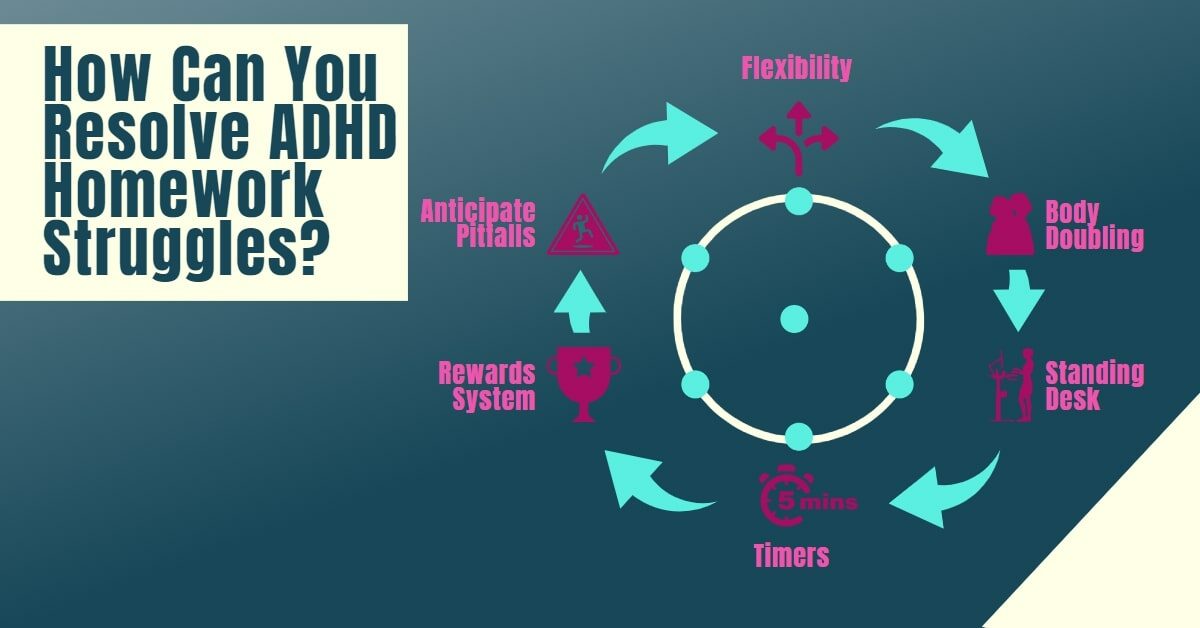
17 Nov ADHD Homework Struggles and How to Cope With Them
ADHD HOMEWORK STRUGGLES AND HOW TO COPE WITH THEM
There’s too much struggle with homework, but for students with ADHD, it’s notoriously even more complex.
Procrastination, planning failure, disorganization, sluggish behavior, and rushing attitude during homework sessions leave parents with a bad taste in their mouths.
But, let us start with the obvious.
How does an iceberg look to you?
A piece of ice floating on water. Right?
Nevertheless, that is just an external description!
It is a large block of ice with the top half visible above the surface while a huge mass remains underwater.
ADHD shares a common pictorial analogy with the iceberg.
What you see are the external symptoms of ADHD. With ADHD, there is a lot more going on inside the human body.
The iceberg analogy is meant to show people the full experience of having ADHD since a lot of it is invisible to others. The comparison helps people understand how the internal experience of ADHD differs from other people’s lives in quality and intensity.
— AIMEE DARAMUS
What Impact Does ADHD Have on Children?
ADHD can significantly affect children’s daily lives. They go through a range of symptoms associate with ADHD internally, including:
- Decision paralysis
- Mood swings
- Emotional dysregulation
- Frustration
- Time blindness
- Inflexibility
- Low self-esteem
- Learning disabilities
However, students with ADHD exhibit most of these behaviors because they lack executive functioning on a broader scale.
Executive functions are the skillset that helps humans perform daily tasks, such as researching a project, organizing household items, doing laundry, planning the day, and scheduling tasks, among others.
Executive functioning includes time management, organization, working memory, self-control, thinking, etc.
However, to improve your child’s behavior, you need to fix the perception that your child is not making enough effort!
Also, it would be best to fix your aggressive reflex toward the child for not doing the homework.
Let us start with real-life examples.
These case studies are from Chadd in discussion with Ann Dolin, MEd – the author of the award-winning book Homework Made Simple – Tips, Tools and Solutions for Stress-Free Homework.
Case 1:
“No idea how to get started with homework for my eighth grader. However, my child finds homework boring – help me to guide my child?”
The resistance to homework is greater for mid and higher-grade children. Additionally, they are resistant to parents’ overtures. The best way will be to encourage your child to start prioritizing homework.
However, giving them choices in the homework session would be best. For instance, you can ask what they like to do first.
It will give them a sense of control over their lives, ultimately keeping them moving forward with the homework. For middle and high school children, you need to be a supporter, not a doer.
Case 2:
“My fourteen-year-old son forgets his homework and struggles with time management for school projects– son spends around an hour researching a book for one slide. How to deal with this?”
The forgetting problem is more common among students with ADHD. Keeping a locker, folder, or container can help your child. Ask your child to keep the homework – books or assignments in the locker. Then, ask them to put what is in the locker into the backpack. It will ensure that homework comes home with them.
Time management is another mountain that students with ADHD struggle to climb. Therefore, long-term assignments can overwhelm your child with ADHD. The best way is to sit with your child and make a game plan to finish the project. You break the whole assignment into small chunks and let your child write them down in the notebook. Also, offer some rewards after your child completes the project.
Case 3:
“My sixth-grade daughter has executive dysfunction and is slow at homework. Teachers advise her to work for one hour and then stop but wouldn’t it drag her down academically?”
It is good to take a break. However, just stopping after one hour can put your child behind others in the class. The better way will be to use timers. You can set the timer according to your child’s ability and schedule a break afterward. Also, you can gradually increase the timer duration.
This technique will help you increase your child’s study sessions without hassle.
ADHD Homework Struggles

Trouble holding information
Children with ADHD struggle with holding information. They forget their homework assignments, lose stationery items, etc. All this is not because they are not careful or sincere – it is due to their ADHD disorder.
These individuals face information processing deficits which creates communication difficulties.
Information deficits can be both – auditory and visual processing problems. Their brain cannot process all the information. Therefore, it drops several information pieces. Henceforth, they compensate with logical reasoning skills.
It makes homework difficult. Children with ADHD forget what information they have gathered.
For instance, children with ADHD cannot complete their chapter exercises/problems questions because they forgot what was in the chapter. Moreover, it makes homework difficult for them.
Poor time management skills
You feel your child is taking more time to complete homework, but have you ever asked how much time it is for your child?
Children with ADHD cannot understand how long it has been due to the lack of executive functioning. It may be 20 minutes for you, but it may be ten or just five minutes for them.
They do not understand how time has slipped by. Therefore, children take so long to finish their homework.
Feeling defeated
Largely, students with ADHD cannot succeed even after much effort. Therefore, they feel defeated and exhausted. As a result, they stop putting effort into academics and several other areas.
Fatigue
Students with ADHD get tired easily due to the constant back and forth about finishing any task. Plus, their hyperactivity, fidgeting, constant struggle to regulate their focus, etc., exhaust them. All this makes them more inconsistent and uninterested in homework.
Medication rebound
Most parents complain that their child studies well in school, but when he reaches home, he loses interest in homework and easily gets irritated.
You and your child come up to this scenario because of the medication rebound.
The process of stimulants wearing off the body is referred to as the medication rebound. When medicine leaves your child’s body, the ADHD symptoms gradually return.
Consequently, it causes the child to avoid homework, which creates heated arguments between you and the child.
However, you should consult your doctor about this.
Difficulty staying interested
Homework sessions require deep focus. However, students with ADHD cannot regulate their focus for long.
The lack of brain neurotransmitters like dopamine is responsible for their distraction. Children cannot see the tasks rewarding until the end due to a shortage of dopamine neurotransmitters in the ADHD brain. Therefore, they lose interest midway.
Learning challenges
ADHD is not a learning disability. However, it makes the learning process complex and challenging.
These challenges arise due to the lack of executive functioning and not because of any disability. Consequently, the way to overcome these challenges, most children lose interest in homework.
These are all the root problems. As a consequence, children tend to avoid or procrastinate when it comes to doing their homework.
How Can You Resolve ADHD Homework Struggles?
The more efficient way to cope with these problems is by managing the symptoms of ADHD.
Coaching your child for executive functioning is the best way to overcome these problems. You can reach out to expert professionals to train your child for executive functioning. A professional coach can train your child with ADHD in everything from organization to time management.
Let us see a few of the best ways to cope with homework struggles:
Flexibility
Children with ADHD do not like to be ruled. They want ownership and control over their lives. Children with ADHD exhibit various disruptive behaviors that affect the entire family. They are more likely not to obey parental instructions.
Offering flexibility can put your child in better condition. It will help your child overcome the mental exhaustion state. As a result, they will look forward to the homework more constructively.
You can ask your child – when they can finish a particular assignment. Or what subject do they want to read first?
It is not important to take constructive opinions of your child only during the homework but every time for everything.
Body doubling
A body double can be a friend, roommate, mother, father, tutor, or caregiver, who can help a child with ADHD complete different and complex tasks.
A body double can be a driving force for your child with ADHD. He or she can help the child get things done right, including homework.
Moreover, the body double technique can also help children reap results in a broader area – eating right, sticking with an exercise regimen, finishing household work, and getting organized, to name a few.
However, not every child can adapt to this strategy, so it’s crucial to check and test whether this can help your child or cause more harm than good. It’s also important to note that most children prefer body doubles from their own peer group.
Standing desks
Movements help children with ADHD stay alert and focused. Standing stimulates the brain’s working memory and its ability to process information.
Also, students with ADHD zone out sometimes during the homework session. A standing desk will make your child more present during homework. Studies show that standing desks increase engagement rates in academics.
Additionally, standing desks increase productivity rates by 45%.
However, you can check out the different homework station designs here for designating the best homework space for your child.
Timers
Timers are a savior for children with ADHD. You must complete the timer, especially when it comes to homework. A child with ADHD struggles majorly with time management and focus regulation. Furthermore, timers will help both of these.
However, parents can adopt techniques like Pomodoro and timer blast to work with timers. You can start timers with small sprints according to the focus ability of your child. Later, you can gradually increase the duration as your child starts to fit in.
Also, there are different online time management tools in the market with useful features that can make your task easier.
Reward system
Children with ADHD cannot see the tasks rewarding until the end due to the lack of neurotransmitters in their brains. Therefore, you need to establish an external reward system to motivate your child.
Setting up a reward system can help children complete homework. An instant reward stimulates the brain cells to stick to the task. However, it is a short-term effect, but it gives children a reason to stick to homework.
Anticipate pitfalls
Children with ADHD go through new battles every day. More often, they are likely to lose. Therefore, parents should step ahead to anticipate pitfalls.
Parents should team up with their children to work on assignments and projects. It will help them cope more effectively with their failure.
For example, do not scold them for the unorganized papers and assignments or for rushing through homework. Instead, address the situation constructively and calmly. Help them release tension through movements and fidget toys. Once they have calmed down, talk to them about how to take things forward.
Listen to Your Child: A Word from Themba Tutors
Just because ADHD is complex does not mean you cannot understand your child. Your child can tell you a lot. Their body language and behavior express their emotions. Listen to them.
Some kids say there is a constant buzzing in their minds, while some feel it is a rollercoaster that hardly stops.
Source – ADHD collective.
No matter how hard life is going, a supportive family is always the best thing a child with ADHD can have.
However, you can use our expert professionals’ help to coach your child. We can help your child overcome root problems like time management, organization, and focus regulation, among others. This will make homework easier. We are here to help you. You can reach out to us anytime!
Check out our other blogs:
⏩ Top 6 Homework Tips For Kids With ADHD
⏩ How To Help Teens With ADHD Tackle Homework
⏩ ADHD Homework Guide
Do you need help for your child with ADHD to finish homework?
Chat with Themba Tutors Today! Our ADHD tutors travel to your home.
We travel to the following locations: Manhattan, Brooklyn, Queens, Staten Island, Bronx, Long Island (Nassau & Suffolk Counties), Westchester County, Connecticut (CT),and New Jersey (NJ).
Free Consultation!!!
Call: (917) 382-8641, Text: (833) 565-2370
Email: [email protected]
(We respond to email right away!)
References:
https://www.additudemag.com/slideshows/homework-frustration-after-school-help-for-kids-with-adhd/
https://chadd.org/wp-content/uploads/2018/06/ATTN_04_12_Dolin_ATE_with_ads.pdf
https://www.helpguide.org/articles/add-adhd/attention-deficit-disorder-adhd-and-school.htm
https://www.davidsongifted.org/gifted-blog/understanding-diagnosing-and-coping-with-slow-processing-speed/
https://www.addwarehouse.com/article5.html
https://www.drakeinstitute.com/add-and-homework
https://impactparents.com/blog/adhd/strategies-to-make-homework-easier-for-kids-and-parents/
https://www.medicinenet.com/13_tips_for_parenting_a_teen_with_adhd/article.htm
Craig Selinger
Latest posts by Craig Selinger (see all)
- Psychotherapy and Support Services at Cope With School NYC - April 12, 2024
- NYC Parents of Teens Support Group - April 8, 2024
- Here I Am, I Am Me: An Illustrated Guide to Mental Health - April 4, 2024





No Comments